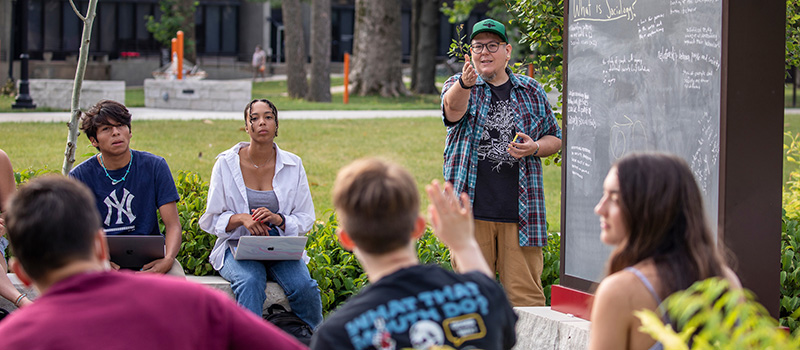Grinnell enhancing scholarship and partnership efforts to maintain diversity following affirmative action decision
May 13, 2024 — Last summer, the U.S. Supreme Court ruled in a pair of cases that higher education institutions, both public and private, could not use race as a factor in the student admissions process.
The decisions upended decades of precedent, policies, and approaches meant to foster more equitable educational opportunities at many institutions including Grinnell College. At the time, President Anne F. Harris and Joe Bagnoli, vice president for enrollment, dean of admission and financial aid, said Grinnell would observe the law and remain undeterred in its efforts to continue to build a student body reflective of the wider world.
 Joe Bagnoli
Joe Bagnoli
During a Phonecast in early April with Grinnell alumni and parents, Bagnoli spoke about the College’s plans for ensuring its commitment to a diverse student body in response to the Court’s decisions and addressed questions, comments, and concerns from alumni about the broader impact of the Court’s decision.
“Nothing, not even the pandemic, has been more disruptive of our efforts to enroll a diverse population of students at Grinnell,” Bagnoli said.
Beginning with the class entering in August 2024, admissions counselors at Grinnell will not know the racial composition of an admitted class until after the class has officially “closed.” Bagnoli said College staff are aware that public institutions like the University of Michigan and Universities of California at Los Angeles and Berkeley saw substantial drops among Latine and Black students after race was removed as one factor, among many, in their admissions processes due to state regulations.
“Some of those enrollments have not returned to their pre-legislative levels despite many years and substantial public investments to address the decline,” Bagnoli said. “Adding to these challenges in our case is that one of the popular proxy factors that higher education advocates have suggested could replace race as a factor in admissions decisions – family income – is not permitted by Grinnell’s need-blind admission policy.”
While Grinnell admission counselors may not take race into consideration when deciding whether to admit a student or not, it does remain legally permissible for the College to maintain its overarching institutional diversity targets and to be intentional in promoting diversity through its recruitment efforts. In recognition of that, the College is adopting a three-pronged recruitment strategy to continue to develop the most diverse applicant pool possible.
The first element in the plan is the continuation and possible expansion of the Laurel Scholarship and Mentorship program. The program awards ten full-tuition scholarships to high-achieving students in the Chicago metropolitan area, who have “demonstrated a remarkable commitment to the well-being of their families, communities, and/or schools.”
 Grinnell College remains committed to a diverse student body. While race may not been taken into consideration in admissions, it does remain legally permissible for the College to maintain its overarching institutional diversity targets and to be intentional in promoting diversity through recruitment.
Grinnell College remains committed to a diverse student body. While race may not been taken into consideration in admissions, it does remain legally permissible for the College to maintain its overarching institutional diversity targets and to be intentional in promoting diversity through recruitment.
The scholarship is coupled with mentoring both before and after arriving on campus. Since its debut, the Laurel Scholars program has led to the enrollment of several students of color, particularly Black students. In light of the Court’s decision, Grinnell has broadened the qualification criteria for prospective Laurel Scholars to include things like the distance a student has traveled over four years of high school and will be working to introduce the program to one and possibly two major metro areas in the coming years.
The second is a new national scholarship, the Presidential Prize for Civic Leadership, which will recognize ten applicants’ commitments to their neighborhoods and communities. The scholarship, Bagnoli said, “reflects interest on our part in the students whose experiences remind us of Grinnell’s commitment to community engagement.” Even if an applicant does not ultimately receive one of the ten Presidential Prizes, Bagnoli said that it’s the College’s hope that many community-minded students across the country consider attending Grinnell.
The third prong is working to develop partnerships with nonprofits and community organizations that can help “build a pipeline of interest from students who might not otherwise consider or even know about the possibility of enrolling at Grinnell.” Some of these partnerships will be new, while some are already in place and may be expanded further.
During the Q&A portion of the Phonecast, Bagnoli addressed that the College had been engaged with stakeholders on campus in advance of the Court’s decision and that these discussions tied into the Grinnell’s new strategic plan, Knowledge into Action. Belonging on campus was identified as a key element in the plan. Bagnoli noted that President Harris has been using the mantra “retention is the new recruitment” to describe the critical importance of ensuring that every Grinnell student feels supported and is equipped to succeed from the moment they arrive on campus.
Other questions from alumni covered some of the other major changes to the College’s admission approach since the pandemic including the no loan policy and test-optional admission. Bagnoli views the no loan commitment as even more significant than the College’s long-standing need-blind policy because the specter of indebtedness associated with higher education and a college’s “sticker price” can create significant anxieties capable of dissuading and discouraging underrepresented students from applying.
Emma Lange ’16, a first-generation Iowa alumna, asked what role alumni can play as Grinnell contends with the impact of the Supreme Court’s decision.
“Evangelizing about Grinnell remains one of the best things alumni can do to support the College’s recruitment efforts,” Bagnoli responded. “In survey after survey, admitted students identify alumni as one of the most important sources in learning about Grinnell.”
This will be particularly important, he added, as the Laurel Scholars program expands, and the new President’s Prize for Civic Leadership is formally unveiled. Bagnoli asked that alumni keep an eye out for the nomination forms and to be alert to students who might meet the criteria for the Prize in their communities.
— by Joe Engleman ’14